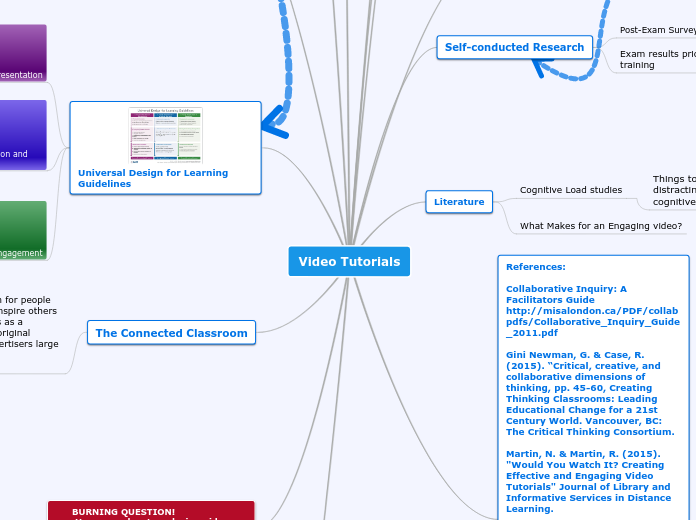Video Tutorials
Collaborative Inquiry
The last stage of collaborative inquiry involves sharing the results publicly. Videos uploaded to YouTube can be shared and celebrated outside of the classroom and anywhere around the world.
Creative and Critical Thinking
Creating educational content through videos is creative, but understanding Google analytics and retention graphs can add a critical thinking side. Teachers can critically reflect on student engagement because Google Analytics allows content creators to view when their audience is engaged in the video, where they are staying and watching the video, and when they are going back or pausing at a certain part of a video.
BURNING QUESTION!
How can effectiveness of a video tutorial be measured?
Measuring Effectiveness
Did the 50/50 pass/fail rate for the Excel MOS exams at Centennial College improve after implementing video learning in the classroom?
Self-conducted Research
Post-Exam Surveys
Exam results prior and post video training
Literature
Cognitive Load studies
Things to avoid in a video that are distracting and increase a student's cognitive load.
Background music
What Makes for an Engaging video?
References:
Collaborative Inquiry: A Facilitators Guide http://misalondon.ca/PDF/collabpdfs/Collaborative_Inquiry_Guide_2011.pdf
Gini Newman, G. & Case, R. (2015). “Critical, creative, and collaborative dimensions of thinking, pp. 45-60, Creating Thinking Classrooms: Leading Educational Change for a 21st Century World. Vancouver, BC: The Critical Thinking Consortium.
Martin, N. & Martin, R. (2015). "Would You Watch It? Creating Effective and Engaging Video Tutorials" Journal of Library and Informative Services in Distance Learning.
Moore, S. (2016) "Shelley Moore: Transforming Inclusive Education" https://www.youtube.com/watch?v=RYtUlU8MjlY
November Alan, (2017) NovemberLearning. https://www.youtube.com/watch?v=C84WHVGod-E Date Retrieved: February 23, 2019.
The Technology Integration Matrix: https://fcit.usf.edu/matrix/matrix/ Date retrieved: July 8, 2019.
Stanley, D., & Zhang. (2018). Student-produced videos can enhance engagement and learning in the online environment. Online Learning, 22 (2), 5-26.
How-to guide for educators who are new to video tutorials.
Screen Recording
Annotations
Audio
Sharing
Closed Captions
Following the Mouse
Zooming In
Innovative Curriculum Planning
How can videos be used effectively in the flipped classroom?
It is important to pair video with other pedagogical strategies such as self regulation and time-management.
BURNING QUESTION!
What features of video editing programs and platforms (such as YouTube) support principles of universal design?
Reaching the students who need the most support and the ones who need a challenge through universal design. This could be applied to video features that allow students to study at their own pace.
Moore,S. (2016).
Universal Design for Learning Guidelines
1.Provide multiple means of representation
Learners have options for perception as there are alternatives to auditory information. This relies on the teacher providing closed captions so that the tutorial can be read as well as heard. While adding captions, an instructor can also add a script below the video in the description box so that there is an alternative to visual information as well
2. Provide multiple means of action and expression
Students can create their own video playlists that are related to the video a teacher uploads. When watching a video on YouTube, the YouTube algorithim will suggest similar videos and the students have the option to save similar videos into a playlist or share with classmates.
3. Provide multiple means of engagement
Students can choose where to watch and when to watch a video that you have created. This can minimize distractions as students can choose their environment for learning that might be outside of the classroom. Students can stop, pause, and slowdown a video as they wish which provided multiple means of engagement. Teachers can also provide multiple entry points to a video by creating time stamps that students can interact with and click on to go back or to skip forward to a certain part of a video.
The Connected Classroom
Youtube provides a forum for people to connect, inform, and inspire others across the globe and acts as a distribution platform for original content creators and advertisers large and small.
edudemic.com
BURNING QUESTION!
How can educators design video tutorials that students will want to watch?
Measuring Engagement
What do students value?
A creative hook
Good Stories
Short videos
Audience Retention Scores
The improved engagement video
The way too long video
The confusing/challenging video
The covering too much video
Professors at Semicole State College found that on average of all the educational videos created by their professors, 35% of viewers completed watching the full tutorial. Also, the average viewer watched 54 % of the video, Martin (2015).
